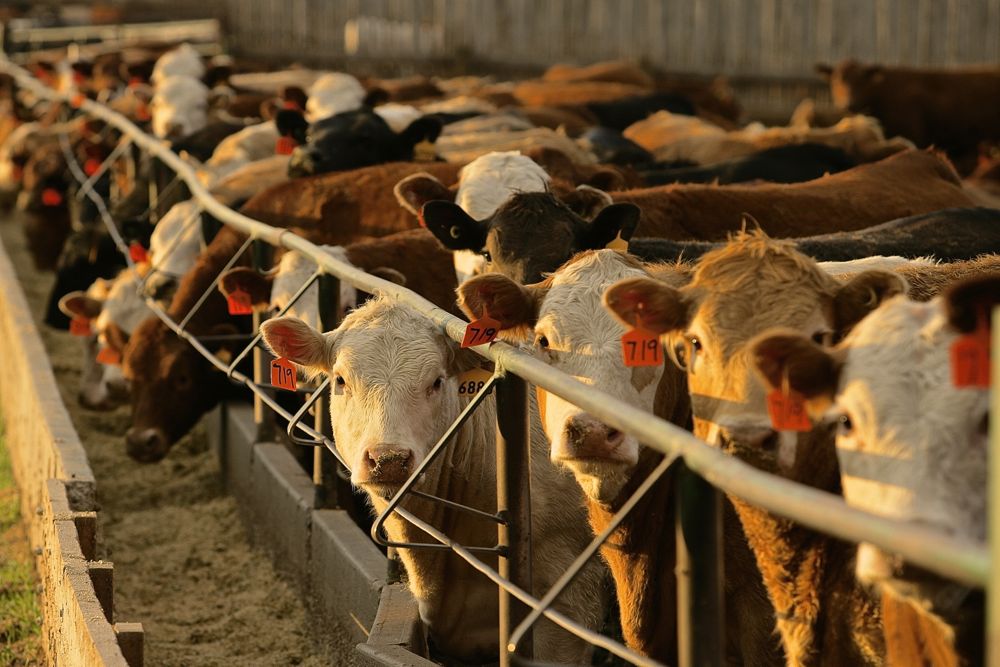New insurance will protect N.B. cattle producers from price fluctuations

Maritime provinces the last part of Canada to get a beef cattle market insurance program
by Rebekah Houter – CBC News
For eight years, New Brunswick farmer Trevor Welch pushed for a change that would give cattle producers in the province more financial stability in the beef market.
Now, his efforts are paying off.
A beef-cattle market price insurance program started in New Brunswick in June as a two-year trial. It initially covers younger beef cattle but by fall, it will be available for older animals as well.
Under the pilot program, producers are assured their cattle will have the same value they had when the insurance was purchased.
“It’s certainly been a long time coming,” said Welch, whose farm in the Carleton County community of Glassville has 60 head of Angus beef.
Welch, the chair of the New Brunswick Cattle Producers, said the Maritime insurance program will provide stability amid often-fluctuating beef prices.
“For me as a cow-calf producer, it’s going to provide a little bit of stability for me knowing that I can purchase an insurance policy that will tell me — whether it’s 12 weeks or 36 weeks away — I’ll know what the price I’m going to get for my calves,” Welch said.
Trevor Welch, shown here on his favourite horse, says it’s like having insurance on a car or house — nice to have when you need it and peace of mind when you don’t. (Submitted by Trevor Welch)
Farmers across the Maritimes, who can already get insurance coverage for other livestock, have been asking provincial governments to help manage the risk amid fluctuating market prices for beef.
New Brunswick has about 500 beef producers, with about 11,000 cattle in total.
Amy Higgins, who runs a small herd of Angus cattle, said she has already signed up for the insurance. Along with more financial stability, she said, the program will allow beef producers to finance other needed farm projects.
“If we aren’t making a lot of money, we typically aren’t spending a lot of money,” said Higgins, who is a project co-ordinator with the Agri-Commodity Management Association, an organization that provides administrative support for small farm groups.
She said the program is flexible and can adapt to the needs of individual farms.
“It does give a lot of flexibility into the producers’ hands, which from a risk-management perspective, all producers are going to have different levels of risk exposure,” Higgins said.
The pilot program started in Prince Edward Island this year as well. Nova Scotia is working on a similar program, but there is no startup date yet.
How the insurance works
Welch said one of the benefits of the program is that farmers aren’t locked into a set payout if the market is doing better than what they paid for.
“If the market goes up, well, then my insurance policy will just time out, and I would sell them for more than it was worth,” Welch said.
“But if the market goes down, then I’m guaranteed the price of those animals that I’m selling, which up until now, the farmers in the Maritimes never had before.”
With about 11,000 beef cows and 500 farms, New Brunswick is one of the last provinces to get insurance on market prices for cattle. (Submitted by Amy Higgins)
Welch said beef prices can fluctuate daily. In 2003, for example, a national outbreak of BSE, also known as mad cow disease, brought prices down overnight by 75 per cent.
He said the insurance program will ensure that producers know the price they will get as soon as they purchase the insurance.
The farmer pays 100 per cent of the premium they choose, while the administration costs of the program are covered by the provincial and federal governments.
The future plan
Kara Chisholm, the managing director of the Maritime Beef Council, said the Maritimes were the only part of the country to not have a program like this.
“That’s the goal, to fill in that last gap,” she said.
And while beef farmers will get some stability from the program, hamburger lovers won’t see a price difference when buying meat.
“It’s not affecting the market price at all,” she said. “So the consumer shouldn’t see a difference at all.”
Agriculture adviser Cedric MacLeod was one of the farmers pushing for the insurance.
MacLeod, who with his wife Alana, has 45 head of cattle at Local Valley Beef in Carleton County, said the program was “sorely needed” because without it, cattle producers were left at the whim of the market.
The federal and provincial governments are covering the administrative costs of the pilot program, which will run until June 2026. The provincial Agriculture Department would not say if the program will be extended beyond then.
Department spokesperson Mark Taylor said officials will assess the program to see if it creates financial stability for cattle producers. He said the goal is to help further the growth of beef production in the province, and the department is “quite confident that we can achieve that.”
Like any insurance policy, Taylor said, premiums can change based on market conditions.
Welch said he hopes the financial stability offered by the program will help younger or newer farmers plan for the future.
He said his own 120-year-old family farm is going strong, but having peace of mind about finances is a big deal.
“This is going to add some confidence and hopefully allow beef producers to sleep a little better at night,” he said.













